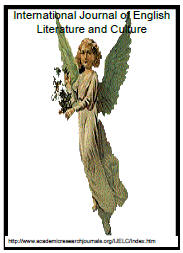| IJELC |
International
Journal of English Literature and Culture |
||||||||||||||||||||
|
International Journal of English Literature and Culture Vol. 3(7), pp. 203-210, July, 2015 ISSN: 2360-7831 DOI: 10.14662/IJELC2015.056 Research Paper Rokeya’s Sultana’s Dream: A Utopia against a Dystopia
Md. Mohoshin Reza PhD
Assistant Professor, Department of English, Bangladesh University of Business and Technology (BUBT), Mirpur-2, Rupnagar, Dhaka, Bangladesh
Accepted 13 July 2015
Rokeya (1887-1947 A.D) is considered to be the visionary emancipator of women in Bengal (presently Bangladesh). The core inspiration of her literary works rests in her realization of the needs of taking measures against the suppression, oppression and domination of men over the women race for centuries in Bengal. Her mission of sowing the seeds of self strength in the mind of Bengal’s women has always been underlying in her literary works. Sultana’s Dream, one of her distinguished literary pieces in English, written in 1905, is a utopian dream fragment which is a revolutionary attempt of taking remedial measures against the lordship of men over women. In this utopia, the male folk of a land deprive the women race from their rights and manacle them with dominating customs. They consider women as inferior to homo sapience and simply beck and call to men. But, actually, the men of the land lag behind in sense of talents and firmness of character. Most men appear archaic, barbarous and simply imposing to women. They disuse and confine women into seclusion (Purdah), called Zenana. Their social customs completely segregate women from outdoor movement and activities. But things turn reverse in the story. Once, their country comes under a foreign attack. With fragile sense of patriotism, worthless arrogance and incompetence, all men retreat from the battle field and enter their houses to save own lives. In this perilous situation, the ever neglected women race come out of Zenana to save the liberty and sovereignty of their land. As per the customs, men and women should not stay alongside. So, when women come out of Zenana, men have to go inside the seclusion which is now called Murdana (the inner most quarter of the houses). The women folk, however, drive out the invaders and rescue their land. They hold entire power of the state which is now called “Lady Land”. The entire male folk falls victim to a catastrophic squash. They keep staying inside. On the other hand, the intelligent ladies of Lady Land now confine the male folk inside the Murdana (Seclusion) and rule them along with their so called importance of being masculine in sex.
Keywords: Bengal’s women, seclusion, utopia, Lady Land, women emancipation
Cite This Article As: Md. Reza M (2015). Rokeya’s Sultana’s Dream: A Utopia against a Dystopia. Inter. J. Eng. Lit. Cult. 3(7): 203-210
|
|||||||||||||||||||||
|
|
||||||||||||||||||||
